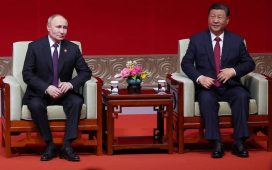Economic momentum appears to have slowed in China, with official surveys finding a slower pace of manufacturing and services activity in April.
After a solid first quarter, the world’s second largest economy has cooled from unexpected gains in March. The erratic demand growth highlights the challenge for policymakers and need for stimulus.
The National Bureau of Statistics (NBS) manufacturing purchasing managers’ index (PMI) dropped to 50.4 in April from 50.8 in March, above the 50-mark separating growth from contraction and just ahead of a median forecast of 50.3 in a Reuters poll.
New export orders grew at a much slower rate, while employment continued to shrink, the NBS data showed.
ALSO SEE: China Warns US Not to Implement Taiwan Aid, TikTok Sale
The services sub-index under the NBS non-manufacturing survey grew at the slowest pace since January, coming in at 50.3 in April compared with 52.4 in March.
“Indicators of business activity in the catering, capital market services and property industries were in contraction,” the NBS said in a statement.
Caixin survey finds export orders up
Another private Caixin factory survey, also released on Tuesday, showed manufacturing activity grew more quickly as new export orders rose.
Analysts say the divergence between the Caixin PMI and the official PMI highlights differences in their geographic and sector coverage.
“Both of the manufacturing and services PMI indexes are near the line of 50, reflecting that the current momentum of economic expansion is mild,” said Zhou Maohua, a macroeconomic researcher at China Everbright Bank.
Investors expect Chinese authorities to launch more stimulus to support the economy and are waiting for clues from the monthly Politburo meeting, which is expected to focus on economic affairs.
With the US Federal Reserve and other developed economies in no hurry to cut interest rates, China may face a longer period of tepid external demand. Adding to the challenges, Beijing continues to contend with trade barriers as the US accuses China of exporting its industrial overcapacity.
Officials this year underscored the need for economic development based on innovation in advanced sectors.
Property crisis, provincial debt hurting outlook
However, analysts said the country’s immediate problem centres around a prolonged property downturn and ballooning local government debt, which have dented household and investor confidence in a blow to the economic outlook.
Several rounds of support measures aimed at turning around the fortunes of the real estate sector have failed to spur a substantial recovery, which is a major reason why China observers remain sceptical about a near-term full-blown economic revival.
IMF Asia-Pacific director Krishna Srinivasan said on Tuesday that it would be beneficial if China scaled back industrial policies to reduce misallocation of resources and excess capacity. Instead, priority should be placed on supporting domestic demand than on supply-side policies, he said.
While stronger-than-expected first quarter economic growth provided a welcome impetus for the rest of the year, weakness in key areas such as March retail sales, industrial profits and property investment has investors fretting about China’s ability to spark a broad revival in demand.
China has set a GDP growth target of around 5.0% for 2024, a goal analysts have described as ambitious.
Julian Evans-Pritchard, head of China economics at Capital Economics, said the ongoing cyclical recovery will persist in the short term, largely on the back of budgeted fiscal support.
“But there are plenty of downside risks, including the threat of foreign trade barriers, a deeper downturn in property construction and a pullback in off-budget local government spending on infrastructure.”
- Reuters with additional editing by Jim Pollard





